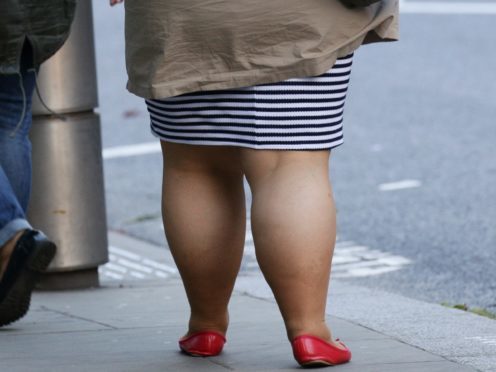Millennials are set to be the most overweight generation since current records began, research has suggested.
More than seven in 10 people born between the early 80s and mid 90s are set to be overweight or obese between the ages of 35 and 44, Cancer Research UK found.
It said this compared to around five in 10 baby boomers – those born between 1945 and 1955 – who were overweight or obese at the same age.
The charity warned that being overweight or obese as an adult is linked to 13 different types of cancer including breast, bowel and kidney cancer, but only 15% of people in the UK are aware of the link.
Cancer Research UK, which made the calculations based on Health Survey for England data, is launching a nationwide campaign to increase awareness that obesity is a major cause of cancer.
Alison Cox, the charity’s director of prevention, said: “Being overweight is the UK’s biggest cause of cancer after smoking, but most people don’t know about this substantial risk.
“If more people become aware of the link it may help spare not just millennials, but all generations from cancer.
“The Government must play a part to help people make healthy food choices.
“We’re campaigning for a ban on junk food adverts before the 9pm watershed to protect young people from advertising tactics which all too often promote fattening foods.”
Cancer Research UK prevention expert, Professor Linda Bauld, said: “Research shows that our evolving environment has a vital role to play in the obesity crisis.
March is just around the corner! Could you take 10,000 steps every day and raise money for life-saving research?! Sign up to #WalkAllOverCancer, here: https://t.co/QESJaknCnB pic.twitter.com/CyF0rMjJKk
— Cancer Research UK (@CR_UK) February 24, 2018
“Clever marketing tactics by the food industry and greater access to unhealthy food are all likely to have contributed to the rise in obesity rates.
“Extra body fat doesn’t just sit there, it sends messages around the body that can cause damage to cells.
“This damage can build up over time and increase the risk of cancer in the same way that damage from smoking causes cancer.
“While these estimates sound bleak, we can stop them becoming a reality. Millennials are known for following seemingly healthy food trends, but nothing beats a balanced diet.”
Responding to the research, Tam Fry, chairman of the National Obesity Forum, said the figures were “horrifying”.
“They are the result of successive governments paying only lip-service to tackling an obesity crisis which was already headlines 10 years ago,” he added.
“Worst still, the Conservative government in 1991, even as today’s millennials were being born, reassured everyone that it aimed to hold obesity to less than 7% by 2000.
“Yet it did nothing to achieve its target. Such appalling arrogance more or less ensured the 70% of unhealthily overweight adults that Cancer Research UK predicts.
“Until the UK gets a government that is serious about obesity and implements the bold policies that we have long been promised, 70% could well be an underestimate.”
Public Health Minister Steve Brine added: “These figures confirm what we know already – childhood obesity is an enormous health challenge, one that is putting young people at risk of dying from preventable illnesses later in life.
“That is why we are delivering the most ambitious childhood obesity plan in the world- taxing sugary drinks, helping children to exercise more, funding more research and cutting sugar and calories in food before it hits shelves and plates.
“However, we have been clear this is the start of the conversation and the Government is determined to go further to tackle obesity.”
